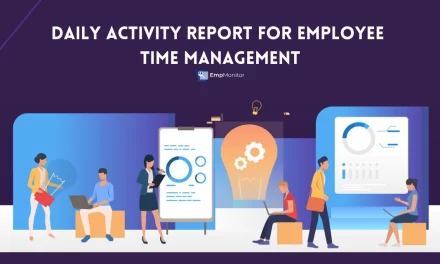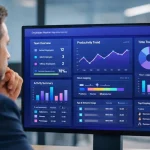Today COVID19 pandemic has changed the way of our living and working. Although working from remote places was in work culture even before the spread of pandemic COVID19. With the widespread of coronavirus around the globe, it has changed the entire scenario of remote employee productivity. Companies prefer more and more employees to work from home or the comfort of their place.
Another reason which pushed the industries to promote remote work culture is the research studies, which show that remote employees work 1.5 days more in a month than office counterparts. 69% of surveys in enormous companies have given results in favor of work from home productivity increases.
The change in the work environment also raises the concern for companies on how to measure employee’s productivity remotely and monitor his activity to reap more output from the employee. To resolve this problem, companies have to rely on the traditional method of tracking employee activity or adapt the productivity measurement software in their workplace. There are different metrics to measure the remote team productivity in different sectors, from sales, marketing to customer support, and HR. Let’s explore the different metrics related to different sectors that we have to monitor to measure the productivity of remote teams.
Metrics to measure productivity of remote team
We do the team performance measurement based on certain criteria, which is impactful in their niche, whether it is sales or marketing or customer support or HR. Metrics that we used to measure have been selected based on experience and common practice tools in that niche. These performance metrics help in analyzing the productivity of remote employees.
Performance metrics for sales
Sales are the major part of any business, and companies focus more on their selling rather than any department. The more a company does sales, the more it runs efficiently on profit books. Therefore, the sales team must work efficiently, or else the company will incur losses, and it will lead to its doom.
- The volume of Calls is the total number of calls that an employee handles during a specific time, for example, if the employee can attend fifteen calls in an hour it means total volume is fifteen for an hour. Then they use this data for comparative study against the total number of sales converted from these calls. This comparative study of sales converted to call volume is the performance metrics of your employee of how he is working with customers.
- Sales per rep are the measure of total sales made by an employee. This individual data is very crucial in calculating the performance of your employees. This indicator also puts the spotlight on the individuals who are contributing more to overall sales made by the company.
- Average deal cost is another important metric in which individual data is analyzed based on overall sales average in a week or a month. The average selling data also helps in measuring your team performance.
- Lead generation to conversion rate is yet another important aspect to measure the performance of an employee. This indicator shows the number of sales conversions made by an individual from given leads.
- Revenue per sales rep is the ratio of revenue generated by an individual during each sales call. Metrics help in measuring the profitability against the work of an individual.
Performance metrics for marketing
Marketing is another important aspect of the company strategy to raise the sales of their products and book profit. Therefore, we should give special attention to marketing as it will be helpful on the front end conversion of leads to customers.
- Website sessions are the first thing that comes in mind when dealing with digital marketing segments. The session is the visit and interaction request made by the specific user on a website in a timeframe.
- New marketing qualified leads are the universal metrics in use by professionals. By this, they measure the lead quality, which results from generation through marketing and passes this information to the sales department. We give the marketing team targets regarding marketing qualified leads, which include the number of marketing qualified leads and the rate of their acceptance.
- The visitor to lead ratio is another metric in which we calculate the percentage of visitors to our website or marketing page or banner, and through this, we can get leads. We can consider it as the ability of individuals to attract the target audience, and this is a measurement of efficiency of a website or banner, which helps in converting the audience into leads.
- Cost per acquisition is a ratio of total investment by a business firm to gain new customers. This includes the whole effort and expense made by a company related to sales and marketing, which attracts potential visitors and convinces them to buy the product.
- Return on marketing investment means the total revenue collection by a marketing campaign after the sale of any product compared to total expense for running the particular marketing campaign because this calculation of time, energy, and advertising with results helps in contributing to company growth.
Performance metrics for Customer support
Customer support services are an important part of business firms. Here, the individual has to provide the best services to the customers. It is the best treatment given to a customer by which the brand gains the reputation of loyalty.
- Call volumes are the number of calls which one customer support employee covers in a timeframe. This metric also measures the number of incoming calls along with several calls in a queue to automatic call distribution service.
- Average speed to answer is a metric in which we calculate the time taken by customer support employees to answer an incoming call or message. The fact behind these metrics is that quick replies by employees will cause greater customer satisfaction.
- The first response time is the minimum time of response to customer issues by a customer support services agent. Here, the speed of answering reflects the commitment toward the responsibility of customers.
- Customer service satisfaction helps in the analysis of customer support agents performing their job. By seeing the data of satisfied and unsatisfied customers, we can get the knowledge that remote employees are working effectively or not.
Performance metrics for HR
- Net income per employee is the analysis made because of net profit income in the last twelve months by the total number of full-time employees working. Companies have to keep in mind that labor needs differ regarding sectors of the same industry, and the above ratio is used to compare the companies within an establishment.
- Sales per employee are the total sales within the last twelve months by the current number of full-time employee engagement.
- Payroll to revenue ratio analyzes the effectiveness of business regarding the utilization of labor costs to produce revenue.
- Expenses per employee are the ratio of operating expenses in the last twelve months to the current number of full-time employee engagement.
- Employee turnover is the analysis of employees leaving the organization, which calculates annually voluntary and involuntary categories separately.
Measuring Remote employee productivity
EmpMonitor is a reliable remote employee productivity measurement software. This software tracks every click made by your employee. It also has features like screen recording and remote access to computers. EmpMonitor can notify the violations by employees using prohibited websites and social media in working hours. EmpMonitor has the feature to set the target for team members for work. The point to install EmpMonitor is that employees must know the productivity measurement system in advance so that they can collaborate on these efforts. Moreover, it can help to effectively manage the workload distribution of your employees and avoid employee burnout.
Conclusion
The use of productivity metrics is an important measure for the firm to calculate the productivity of remote teams because sincere remote team productivity contributes to the profit of the business. And for this, the company should use productivity measurement software like EmpMonitor. This software ensures that employees are using their work hours properly according to designed productivity metrics. Another important aspect to keep in mind while dealing with employees is that they get used to working remotely sometimes. Work from home productivity of the team will be efficient if we provide the necessary support to our teams to finish the job on time.
Also Read
How Timeboxing Works And Why It Makes You More Productive?
Employee Monitoring: Productivity Booster or Privacy Killer?













